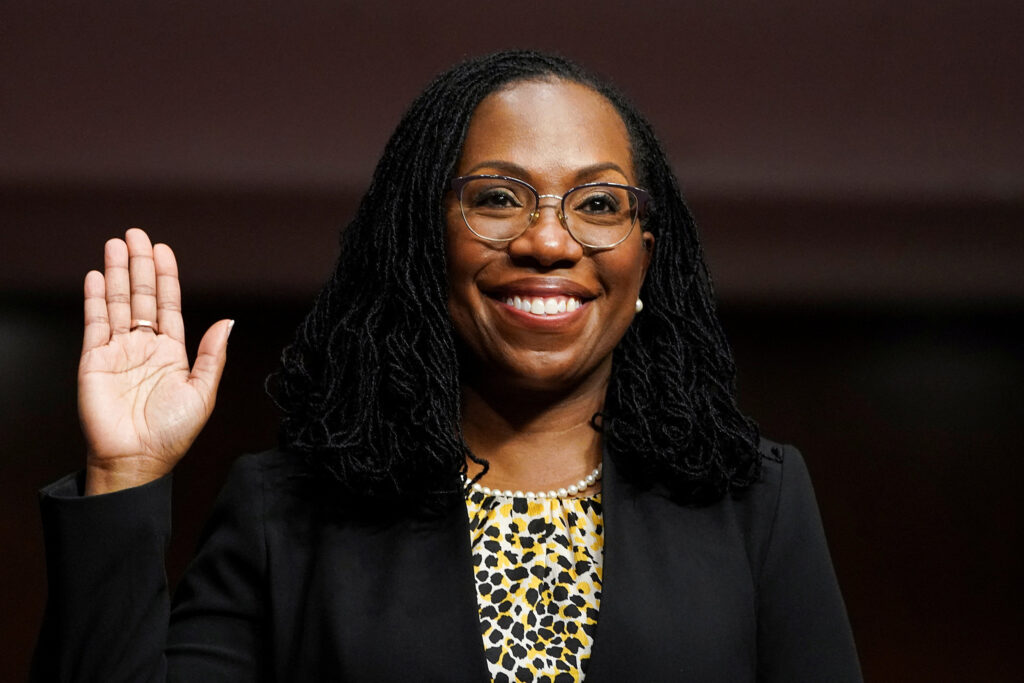On Friday, President Joe Biden announced his nomination of Judge Ketanji Brown Jackson to the Supreme Court. His pick is a home run. Jackson’s personal story is compelling; her qualifications are sterling; her jurisprudence hits the sweet spot of progressive pragmatism; and her candidacy is, of course, historic. In spite of gripes from the right, she seems poised to glide onto the court with just a few inevitable bumps and a final vote that’s closer than it should be. Democrats need a win right now, and the Supreme Court needs a fresh voice to invigorate the beleaguered liberal wing. Jackson’s confirmation will provide both.
Start with the obvious: No Black woman has ever before sat on the Supreme Court. It is long past time to end that travesty and ensure that SCOTUS looks more like the country it serves. There is nothing remotely unseemly about Biden’s decision to nominate a Black woman to this seat; to the contrary, there is a long tradition of presidents choosing justices on the basis of their race, ethnicity, gender, and religion. This consideration of identity brings huge benefits to the court: Diversity on the bench shores up public perceptions of its legitimacy and competence while bringing different viewpoints, backgrounds, and experiences to the bench. A less homogeneous court has fewer blind spots and a deeper understanding of injustices that it is duty-bound to address, including discrimination and voting rights.
Diversity alone, however, does not equip someone for Supreme Court service, and not every historically marginalized candidate’s journey to the bench amplifies their sensitivities to the plight of the less privileged. Here is where Jackson’s career sets her apart from other women on the shortlist. Her parents worked as public school teachers, then ascended to higher positions within the public education system. Jackson attended Harvard (graduating magna cum laude) and Harvard Law School (graduating cum laude), then clerked at each level of the federal judiciary—culminating in a clerkship with Justice Stephen Breyer, whom she is set to replace. Jackson then spent a few years in Big Law, though she found the lifestyle isolating and unpleasant. She quit in 2005 to become a public defender in the District of Columbia, then joined the law firm Morrison & Foerster for a three-year stint in 2007.
Jackson’s work as a public defender is cause for celebration. No sitting justice has held this job, which may be one factor in the court’s bias toward prosecutors and law enforcement. Jackson represented a range of criminal defendants, including Guantánamo Bay detainees, vindicating the constitutional rights of scorned, persecuted, and impoverished individuals. She took on these cases at great risk to her future ambitions; Republicans and conservative media have already criticized her representation of Guantánamo detainees as evidence that she is soft on terrorists. (Her brother served with the U.S. military in Iraq during this period.) Jackson remained active in public defense after rejoining Big Law, winning an award from the American Bar Association for supporting indigent Alaskans’ right to counsel. In 2010, she joined the U.S. Sentencing Commission and played a major role in shortening prison terms for many drug offenders.
The media has made much of Jackson’s most personal encounter with the criminal justice system: Her uncle received a life sentence for multiple drug offenses. (While life sentences for nonviolent crimes are always inhumane, her uncle’s was especially egregious; one state conviction that triggered his federal sentence involved mere possession of cannabis.) But Jackson has not spoken publicly about her connection to the carceral state or the treatment of her uncle, and other family members served as police officers. Whatever impact they may have had on Jackson, it’s clear that she believed passionately in constitutional protections for the accused. This devotion to the Fifth and Sixth amendments—at a time when they are under attack at the Supreme Court—is more than encouraging. It indicates that, unlike her colleagues, Jackson’s perspective has not been permanently skewed toward the powerful and privileged.
Her judicial record bears this out. During her seven years as a federal trial judge, Jackson was practical, thorough, and fair, treating defendants with respect while showing the Trump administration a healthy amount of skepticism. Her most notable opinion swatted down former White House Counsel Don McGahn’s effort to avoid testimony before the House Judiciary Committee. “Presidents are not kings,” Jackson wrote. “This means that they do not have subjects, bound by loyalty or blood, whose destiny they are entitled to control.” After Biden appointed her to the U.S. Court of Appeals for the District of Columbia Circuit in 2021, she joined a landmark opinion denying Donald Trump’s attempt to conceal documents from the Jan. 6 committee. Her first authored opinion delivered a major victory to federal unions. A liberal but not an ideologue, a workhorse but not a showoff—what more could Biden ask for?
In the weeks ahead, the Republican Party and its legal arm will fling baseless accusations about Jackson’s qualifications. Determining whether she is the most “qualified” of the shortlisters, though, is like picking out the smartest student in a class of valedictorians. Obviously, this two-time Harvard graduate has the intellectual firepower to serve. And unlike Trump’s justices, she carved a path in life that was not padded by wealthy parents’ money, power, and connections. Republicans’ complaints about Jackson’s credentials draw on a nasty double standard that subjects Black women to infinitely greater scrutiny than white men.
Biden now has an opportunity to bust these racist presumptions by championing his nominee as the whole package: a legal superstar who went to a public high school—not Georgetown Prep. Jackson has worked her way through the ranks of the profession with compassion, verve, and intellectual firepower, securing a Supreme Court nomination because of who she is as a person and a jurist. She is the right nominee at the right time. The president should dare the GOP to accuse her of being a lesser Black woman. At this point, such insults only highlight the fact that the Republican case against Jackson does not exist.

